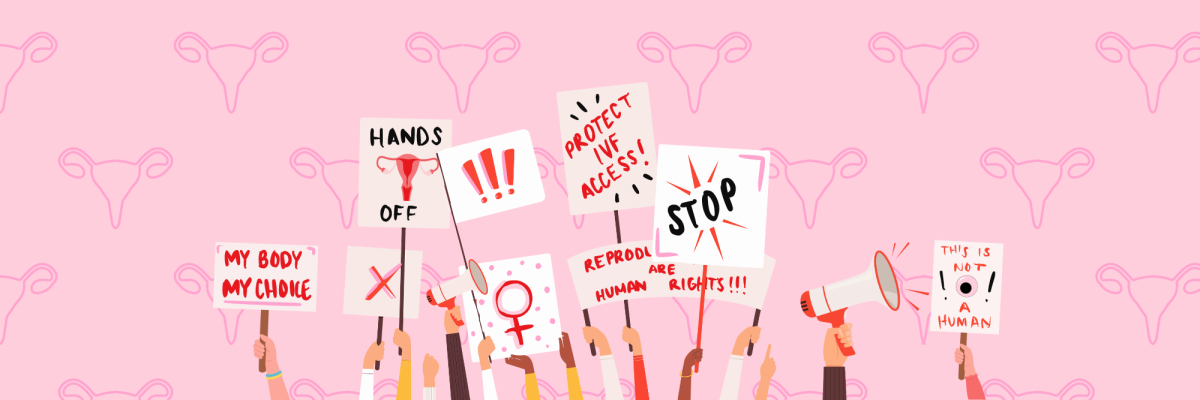With the overturning of Roe v. Wade, the nation has seen several detrimental effects on access to abortion care. However, Alabama has created what seems to be one of the most direct effects yet, putting into state legislature that frozen embryos created through in-vitro fertilization are considered children.
The decision was made by the Alabama Supreme Court after three couples lost their embryos that were damaged by a patient in a hospital in 2020. According to the Associated Press, the couples filed a pair of wrongful death suits, which the Alabama Supreme Court upheld, ruling that an 1872 state law that allows parents to sue over the death of a minor child, “applies to all unborn children, regardless of their location.”
IVF is a process used to facilitate a pregnancy after experiencing infertility. It involves several procedures to collect eggs and sperm to fertilize the egg. If successful, the process will eventually develop one or more embryos that can be frozen or implanted.
In this case, the clinic and hospital are being held liable for wrongful death. The couple definitely has a case for other charges such as destruction of property or negligence — not wrongful death. Embryos are frozen when they are a single cell or a clump of cells called a blastocyte. This is before the cells have developed a heart or brain; it doesn’t make sense to consider them the same as fully developed children.
Fertility clinics have already begun fearfully suspending their services after the decision. The University of Alabama at Birmingham has paused IVF services to prevent its physicians from being prosecuted for doing their jobs. This is a detriment to doctors and patients alike, as both are losing an important part of their lives without being given a voice in the matter.
As of Feb. 22, three fertility clinics in Alabama have paused their IVF services and implored the Alabama Supreme Court to reconsider this decision. If the ruling is maintained, there is no way to predict how many physicians, clinics and individuals will be impacted.
According to Dr. Mari Mitrani, the chief scientific officer at a genetic counseling business called Gattaca Genomics, “This ruling poses a threat to embryologists, fertility doctors, lab technicians and all fertility healthcare providers in Alabama.”
An OB-GYN and medical advisor, Dr. Mary Jacobson, also disagreed with the decision, saying “Most of us became doctors to help people. Criminalization of positive intention pits infertility teams against patients and will have devastating effects.”
Justice Greg Cook was the only member of the court to dissent, and his opinion matches that of many fertility doctors, universities and other fertility organizations in the state. The consensus is that it will prevent those who need IVF to conceive from receiving these services.
The ruling also takes into question excess or unused embryos. Typically, it is the parents who decide what to do with the embryos, but now the decision could cause anyone involved to be charged with wrongful death or a similar charge. This makes it more difficult and fear-inducing for anyone involved in the process of IVF.
Alabama’s decision is not shared by the White House, which made a statement saying it reflected the overturning of Roe vs. Wade, and Vice President Kamala Harris shared the sentiment, saying on X that “This decision is outrageous − and it is already robbing women of the freedom to decide when and how to build a family.”
Women who have used or plan to use IVF in Alabama are struggling with what to do after the ruling. According to The New York Times, women who were interviewed “felt abruptly stuck in limbo” and those who had children through IVF were “afraid to do anything with their extra embryos from the process.”
The nuances in this situation are endless and unpredictable. The women in the Times article wondered whether they would have to continue storing non-viable embryos, even if they would miscarry when implanted. Embryo storage can be costly at about $400-$600 per year, and once people have conceived the number of children they want, they will be left with no option but to continue paying to store additional embryos.
If parents must pay to store their frozen embryos, the state of Alabama should take the financial burden they have imposed and subsidize the storage of frozen embryos. This further exhibits the lack of care on the part of Alabama officials; they are enforcing legislature that affects their constituents, yet are providing no assistance and no answers.
After the ruling, women and doctors of Alabama are left with nothing but questions about the future. These individuals have no one to turn to and the government is turning a blind eye. This is a ruling that was decided by officials who are not experts in matters of fertility, and it lacks the medical input that such a nuanced situation desires.






















